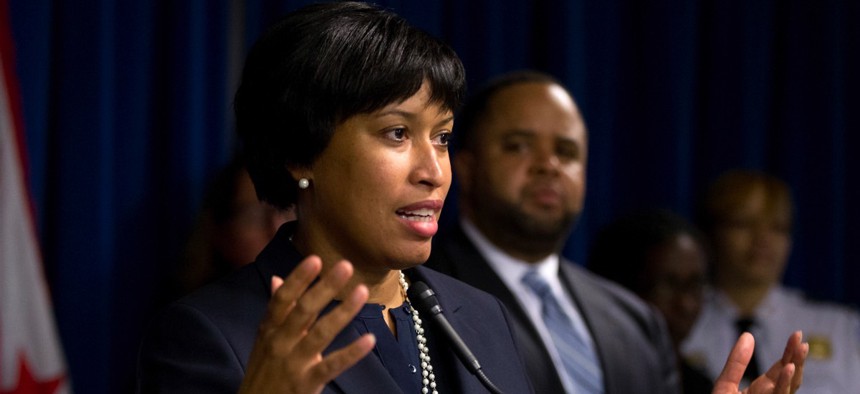D.C. Just Went ‘All In’ on Data Accessibility

Washington Mayor Muriel Bowser speaks Dec. 15 about the release of police body camera footage related to the death of special education teacher Alonzo Smith. Manuel Balce Ceneta / Shutterstock.com

Connecting state and local government leaders
The District of Columbia followed up the release of several key local government datasets with a Draft Open Data Policy that's up for online public comment.
WASHINGTON — The District of Columbia released a Draft Open Data Policy on its newly launched drafts.dc.gov site—intensifying citizen engagment in lawmaking on the OpenGov Foundation’s Madison platform.
For four weeks, residents, tech activists and government officials can comment on the document providing for the creation of an "Independent, Regional Data Catalog," the District government announced this week. The District's other policy initiatives include hiring a chief data officer within the Office of the Chief Technology Officer (OCTO), starting an Open Source Program and reviving the Open Government Advisory Board.
Mayor Muriel Bowser’s administration has been steadily making data more accessible, rolling out an Economic Intelligence Dashboard last week and then a weekday crime stats update earlier this week.
“The URL of D.C.’s Madison site tells you everything because just putting ‘Draft’ at the top of a document, even if it’s something fully baked, was government and elected officials taking a meaningful step toward their constituents,” said Seamus Kraft, the OpenGov Foundation’s executive director, said in an interview. “It tells them, ‘I actually haven’t finished this, and I’m going to consider what you have to say.’”
City Council started working with the OpenGov Foundation on DC Decoded, opening legal data in mid-2013. Councilmember David Grosso unveiled the first opportunity for citizen drafting of laws using the Madison open-source platform in May 2014—the biggest use case being urban farming.
Drafts.dc.gov improves upon design and data accessibility and features a new annotation tool.
On the backend, workflow and internal collaboration on the drafting of legislation are enhanced by allowing for the administering of groups.
“One of the coolest things about the culture change is that yesterday representatives formed a bridge between the executive branch and legislative branch—facilitated by open source software and open data,” Kraft said.
The new site makes it easier for people who might not have time to testify to be heard and understand what’s happening, he added, as well as know that, if nothing else, their comments got through thanks to read notifications.
As of 6:30 p.m. Wednesday, 20 participants had made three comments and 83 annotations on the Draft Open Data Policy—eight voicing support.
Along with Tuesday’s announcement, Bowser announced Archana Vemulapalli, the CTO of facilities management company Pristine Technologies as the District's new chief technology officer.
“When we share our knowledge with District residents, we are more effective—and more powerful,” Bowser said in a statement. “With this policy, we will make the District one of the most open jurisdictions in the country.”
PREVIOUSLY on Route Fifty: "How D.C.'s Office of Open Government Is Transforming Government One Day at a Time"
Dave Nyczepir is a News Editor at Government Executive’s Route Fifty.

NEXT STORY: This Utah Ski Town Drives Record Citizen Engagement With Its Water Portal





